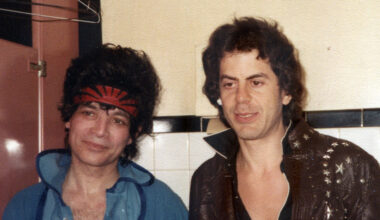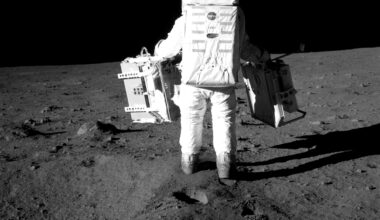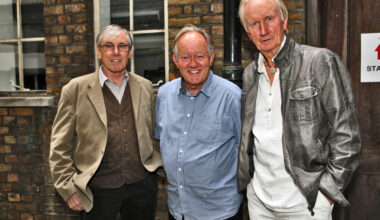Smash hits? They’ve had ’em. Enormodomes? They’ve played the lot. Life? They’ve lived it. With a new album on the shelves, we catch Simple Minds’ founding members Jim Kerr and Charlie Burchill at their Glasgow HQ… forget about them? Not a chance
Jim Kerr and Charlie Burchill probably aren’t alone in being able to remember the exact occasion when they first experienced the mesmerising Moog and bewitching vocals of Giorgio Moroder’s groundbreaking electro-disco classic, ‘I Feel Love’. Nor are they unique in it sparking an electronic epiphany that continues to order their lives to this day. But, quite definitely, they’re the only two people to ever have had this experience in a seriously rough Glasgow nightclub, at a critical juncture en route to becoming multimillion-selling synthrock stars.
“T1, St Enoch Square was it? There was a dance down there…” recalls guitarist Burchill of the city centre dive where an embryonic incarnation of Simple Minds – then starting out as short-lived punk outfit Johnny And The Self-Abusers – played a fateful gig in the summer of 1977.
“It was heavy,” weighs in singer Kerr. “It was never a place we’d go, but we got a gig there and it was almost – how do you say this – it wasn’t so much the cooler kids that came.”
“People would take ice skates,” adds Burchill.
Ice skates? I ponder… Oh, I see, not for ice-skating.
“Its full name was Terminal One,” shudders Kerr. “Terminal was a great name for it.”
Such was the antagonistic spirit of punk, and the antipathy its loud volume, loud attitude and even louder hair and fashion styles provoked among the quick-to-the-fist Scottish public, that the threat of violence always somehow seemed to linger around Johnny And The Self Abusers shows.
They spent less than a year together and, in an immaculate punk manner, they split up on the day their debut single was released. The band, it should be noted, were hardly pacifists in all of this – it wasn’t unheard of for the first pint glass to be thrown from the stage rather than at it by these snotty, loud-mouthed, trouble-seeking kids from the south side of Glasgow.
“We’d spent the whole afternoon in this pub in Queen Street doing interviews with punk fanzines,” reminisces Kerr, “drinking wine and proclaiming, ‘Punk is absolutely everything; there was nothing before punk, there’ll be nothing after punk’.
“Then we went down to play the gig, and I remember the DJ said, ‘Youse are on after this next record, but it’s alright you’ve got a bit of time because it’s a 12 inch’. And we were like, ‘What the fuck’s a 12 inch?’. I remember we were standing at the side of the stage and feeling the pulse of ‘I Feel Love’. Between that and whatever we were taking and the drink, it was like, ‘Punk’s finished. Listen to that!’.”
It would be oversimplifying things to draw a straight line from those game-changing eight minutes of music to the moment just over 40 years on when I sit down for a chat with Simple Minds’ two remaining original members. We’re in the lounge of Gorbals Sound studio in Glasgow, not a mile from the scene of their oracular encounter with Moroder and Summer. There have been falters, wobbles, mistakes and outright reverses on the band’s journey from pioneering dark art-pop futurists to glossy, air-punching stadium fillers. These august statesmen of electronic music even faced setbacks during their peak years as Live Aid-playing, US-conquering, U2-enabling chart-toppers.
But it is an unbroken line from then until now. Whether in or out of fashion, Simple Minds have been a near constant fixture on the music landscape for four decades; no splits, no reformations, just a fair few line-up changes along the way. With the release of ‘Walk Between Worlds’, their 19th studio album, and another new line-up (including the replacement of long-time drummer Mel Gaynor with Cherisse Osei), they show little sign of stopping soon. More on the new record in a bit, but first back to 1977, when ‘I Feel Love’ found willing ears already piqued to music’s post-punk possibilities.
“We were into krautrock and all that stuff,” says Kerr, one of rock’s most famously loquacious frontmen, a talker so enthusiastic that mid-sentence he sometimes spills partway off the couch and adopts an uncomfortable looking posture with one knee leaning on the floor. His ideal foil in more ways than one, songwriting partner Burchill seems good at just letting Kerr talk when he gets going.
“Also, at some point around then, Charlie had said to me about synthesisers being the new thing,” continues Kerr. “Before then, synths had been the size of a fridge, and you needed two guys in white coats to plug them in, but I remember even then Charlie saying, ‘They’re getting cheaper. We need to get a guy in with a synth…’, but we didn’t even know anyone with a synth.”
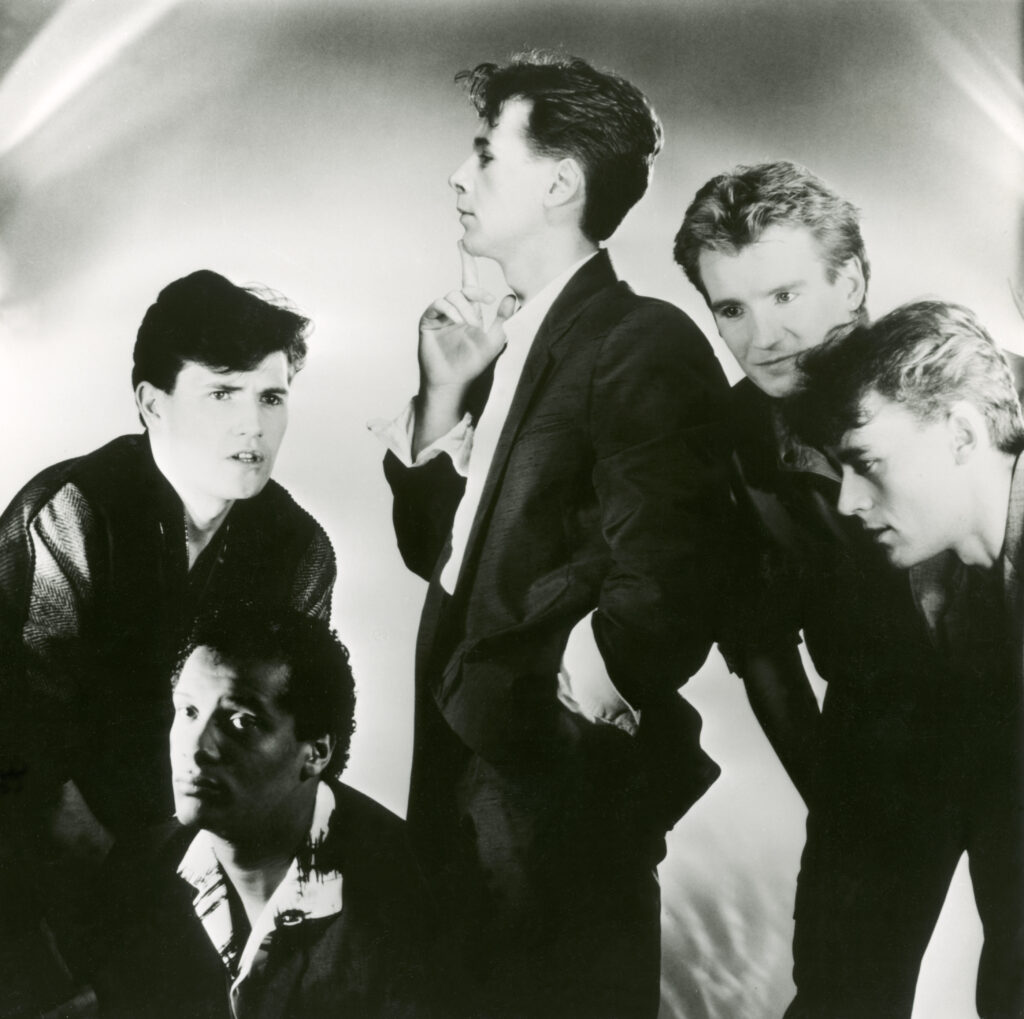
Barra-born keyboardist Mick MacNeil would eventually join the rechristened Simple Minds after Burchill spotted him playing in a wedding band, bringing the prized sound of sci-fi machines into their compositions at last. After signing to Arista in 1978, they went on to record a trio of visionary early albums in 1979’s, ‘Life In A Day’ and ‘Real To Real Cacophony’ and 1980’s, ‘Empires And Dance’, each shimmering with sonic invention and possibilities.
They were characterised by spectral frontman Kerr’s haunting vocals and Derek Forbes’ distinctively popping basslines. It’d be pleasing to report that those records, which have been so inspiring to all manner of artists to this day – from the Manic Street Preachers to The Horrors – are equally revered by the band. But Kerr and Burchill remember that phase with mixed feelings.
“Looking back at those first albums,” says Kerr, “they were this and they were that, and ahead of their times. But they didnae sell. Since day one we had a great live band and wanted to take it around the world. We’d get excited and think, ‘Oh, there’s five or six gigs in Germany’, and we’d go over there and… no one there. When I say no one, I mean three people in a room that holds 500. Go to Holland, no one there. We were living the life, but not selling records, and it was really hard work.”
This was the juncture at which Simple Minds could have faded out and gone the way of the post-punk bands that inspired them such as Magazine and Joy Division, or their Glaswegian contemporaries Orange Juice, who are remembered much more for their influence than for their actual impact. But Kerr was resolved that they should raise their game.
“It was all about effects and riffs an’ things up till then,” he says. “I remember thinking, ‘We’re going to have to learn to write songs’.”
The oxygen of enthusiastic reviews and a cult following was sufficient to keep Simple Minds alive long enough to secure a new deal with Virgin in 1981, leading to the modest commercial success of that year’s ‘Sons And Fascination’/’Sister Feelings Call’, and then at last their breakout proper the following year with the classic ‘New Gold Dream 81-82-83-84’. It was a record rich with warmth and optimism and sleek hooks, a pillar of the “new pop” era of Top 20-shattering singles. ‘Glittering Prize’ and ‘Promised You A Miracle’ still sound exhilarating to this day.
“I suppose in hindsight it’s much easier to see what the peaks were,” reflects Burchill of (arguably) Simple Minds’ best album, “but obviously when we were making ‘New Gold Dream…’ we didn’t have the massive success then. We had a club hit with ‘Love Song’, but during that period we went through a bit of a transformation. Something came out of it, and that album has become a bit of a milestone.”
By then, a number of younger post-punk bands were already nipping at their heels, including four baby-faced Dubliners who Simple Minds would go on to form something of an alliance with in their ambitions to take it all the way to the top.
“I never saw U2 play until after they had their success with ‘War’,” recalls Kerr. “Obviously they were very impressive, it was so good. I think the thing that struck me was a Vox amp and a wee drum kit, and there was all this power. It was colossal. People say to me, ‘Did you know they would become the biggest band in the world?’ and I say, ‘Yeah, I did’. And they say, ‘How did you know?’. Because they fucking told me! ‘You should fucking go for it. We’re gonna go for it; we’re gonna be the biggest band on the planet. You should go for it as well’. That was the kind of attitude of the time.”
While U2’s claim to the biggest-band-in-the-world throne would indisputably prove stronger and longer, Simple Minds’ came sooner when ‘Don’t You (Forget About Me)’ hit the top of the US singles chart in 1985 and hung around the UK Top 100 for the next two years.
Ironically not the band’s own song, but written by producers Keith Forsey and Steve Schiff and originally offered to Billy Idol, ‘Don’t You (Forget About Me)’ caught the imagination when it featured prominently in the opening and closing credits of John Hughes’ much-loved Bratpack coming-of-age movie, ‘The Breakfast Club’.
Heavy rotation on MTV and a spot on the bill at the Philadelphia leg of Live Aid in 1985 (Kerr in his billowing white trousers remains a memorable part of the event’s iconography) proved a massive career multiplier, particularly Stateside, and their time at the summit of the mountain arrived. Not that they got much chance to admire the view.
“Charlie and Mick started buying keyboards that were worth a quarter of a million quid,” laughs Kerr when I ask him to name something that typifies the sense of achievement and excess of the age.
“It wasnae quite that much!”, counters Burchill, sounding a touch embarrassed.
“I think we were too busy running to really take in the view,” sighs Kerr.

If pushed, let’s say on a scale of one to 10, where would they put themselves and their antics during those heady days?
“The heavy metal bands would have easily been 10,” says Kerr. “I always thought we were a pleasure to go on a night out with. All I knew was, if I stayed up all night I couldn’t perform the next night. It might have been the Presbyterian work ethic, but I always felt guilty about not being able to deliver on stage, so there were nae midgets backstage bringing us pizzas or whatever else, but you know, we went places and people liked us, and we had did have a good time.”
Simple Minds’ chart reign had faded out by the mid-90s, but they’ve continued to record, release and tour regularly, and the years have evidently been good to Kerr and Burchill.
Once distinguished by his ashen white make-up, these days Kerr sports the sort of healthy complexion you’d expect of a man who divides his downtime between running a boutique hotel in Sardinia and hiking in the Scottish Highlands. Still the hard-working sound boffin of Simple Minds, Burchill has been doing what he loves best by holing up in Gorbals Sound for several weeks, drilling the band ready for touring in support of ‘Walk Between Worlds’.
So where does a group who’ve reaped the spoils of success find inspiration so many years deep into their career? In part by delving back into their own history and legacy it transpires, both literal and figurative. Take the track, ‘Barrowland Star’ for instance, the lyrics for which were written by Kerr after bumping into a fan in the street in Glasgow. The man enthused about how his son’s band were to play a support slot at city’s famous Barrowland Ballroom, scene of some of Simple Minds’ most triumphant shows (they filmed the video for their 1983 single ‘Waterfront’ there).
“It’s hallowed ground,” waxes Kerr lyrically of the Barrowlands. He even has an iconic star from its ceiling hanging on the wall of his office. “I thought, ‘I’m going to write this song from this kid’s point of view of going to play the Barrowlands that night’. And also from our experiences of playing there. And within a few minutes it had all popped out. Sometimes you just grab the moment and it becomes a song.”
The Mick Ronson-esque guitars and synth string-layered music, meanwhile, is a reprise of an instrumental B-side recorded back in 1994.
“There were two tracks Charlie made around about that time,” explains Kerr. “I couldn’t come up with a lyric for them; didn’t want to. Tracks like ‘Theme For Great Cities’; they didn’t end up instrumentals just because I never came up with a lyric. I just thought they spoke as they were – some tracks you just leave as is. But in the case of what became ‘Barrowland Star’, it always nagged me; I always thought I could have sung on it. The thing seemed a bit operatic, a bit Bowie. It could be ridiculous or it might work.”
An old instrumental track feels apt coming from a band who have grown increasingly mindful and cautious of preserving their physical and musical heritage for posterity. Recently they got an authority on all things Simple Minds – a member of a tribute band in fact – to archive all of their old recordings, including hours of unreleased material, while Burchill maintains a trove of their classic synths.
“I’ve had a lot of the old keyboards repaired and they’re now in working order in a decent environment,” he reveals.
“We used to have this storage warehouse,” adds Kerr. “It was so jam-packed that you could barely get in it. I remember we had to send one of our kids down to get something out of it, but he came back and was like, ‘Man, it was like Tutankhamun. It was all dirt and dust and stuff from Live Aid. It was amazing’. We got it all organised and hired someone to go through all the tapes. So if Charlie or I go missing one day up in the hills, it’ll be left there organised for a new generation to carry the flag.”
Get the print magazine bundled with limited edition, exclusive vinyl releases

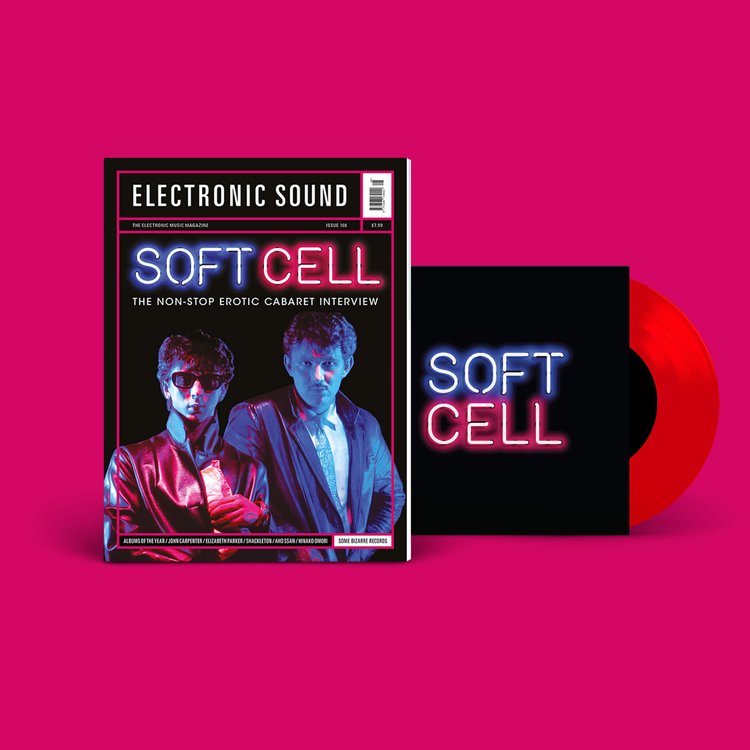

I liken their gear hoarding instinct to the music fan who sagely resisted selling off their vinyl record collection to buy CDs back in the 1990s.
“We didnae sell off our record collections, the ex-wives took them. Liam Gallagher’s got them!”, laughs Kerr, referring to his ex-wife Patsy Kensit and the musician she married after him. “And he’s got my DVDs!”
Coming from a Presbyterian Scottish family on the south side of Glasgow and having emerged as a musician out of the punk scene and all of its DIY and anti-establishment ethics, I wonder if Kerr ever felt conflicted by Simple Minds becoming one of the biggest bands in the world, and the lifestyle and all of the extravagances that came with it?
“It’s a valid question,” he ponders. “But we never bought into that side of the ethic. And we’re arguably more home-made now than we ever were, in that we self-finance everything.”
Simple Minds have gone full circle in some ways, back to their self-starting roots, and if there’s a reason for them to carry on longer still then it’s the same one now as it was back then – the sheer hell of it.
“It’s beyond our wildest dreams. We had to carve this thing out of ourselves. God knows where it’s from. And of course it’s music, it’s personalities, it’s people, it’s all self-made, and we take it around the world, based on the fact that we like it, and hope that it touches other people the same way. And lo and behold, 40 years later, it would seem that it does. It’s kind of mind blowing, really.
The greatest thing about it,” sums up Kerr, as his voice raises to a crescendo with a sermon-like flourish, “the greatest reward has been the experience itself.”
‘Walk Between Worlds’ is out on BMG


